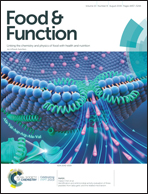Ca2+-Calcineurin-NFAT pathway mediates the effect of thymol on oxidative metabolism and fiber-type switch in skeletal muscle†
Abstract
Thymol is a major component of thyme, and it has been reported that thymol administration reduces body weight, plasma insulin and blood glucose in type-2 diabetes. Skeletal muscle is the most important metabolism organs in the body; however, to date, there is no report on the effect of thymol on skeletal muscle. Our goal was to determine whether thymol has an effect on the different types of skeletal muscle fibers and their metabolism characteristics. Hence, we performed in vivo and in vitro experiments. In vivo, SD rats (4 weeks old) were fed with different concentrations of thymol for 4 weeks, and in vitro C2C12 myotubes were directly treated with thymol for 2 days. The rats fed with 0.025% thymol showed a significantly lower body weight, subcutaneous white adipose tissue index and gastrocnemius muscle index (P < 0.05), while their proportion of brown adipose tissue significantly increased (P < 0.05). The protein and mRNA expression of MyHC I and MyHC IIa in the gastrocnemius muscle of the rats significantly increased (P < 0.05), while the protein level of MyHC II and mRNA expression of MyHC IIb decreased (P < 0.05). Furthermore, 0.025% thymol supplement significantly reduced (P < 0.05) the activity of lactate dehydrogenase (LDH) in the gastrocnemius muscle of the rats, but their succinate dehydrogenase (SDH) and hexokinase (HK) activities increased (P < 0.05). Also, the expression of the fatty acid oxidation-related genes in the gastrocnemius muscle of the rats decreased with the thymol supplement (P < 0.05). In vitro, similar results were obtained. Furthermore, the Ca2+-calcineurin-NFAT pathway, which is an important pathway to regulate the transformation of skeletal muscle fiber type, was studied. We found that the effects of thymol on the myosin heavy chain isoforms, genes related to metabolism and the activation of the Ca2+-calcineurin-NFAT pathway were all reversed by a Ca2+ chelator (P < 0.05). Thus, thymol can promote the oxidative metabolism and fiber type switch in skeletal muscle, and the Ca2+-calcineurin-NFAT pathway plays an important role in it.



 Please wait while we load your content...
Please wait while we load your content...